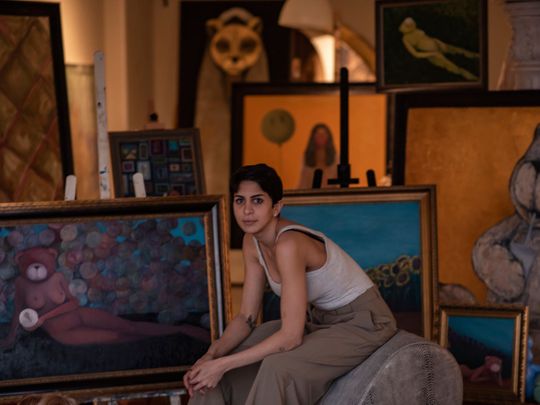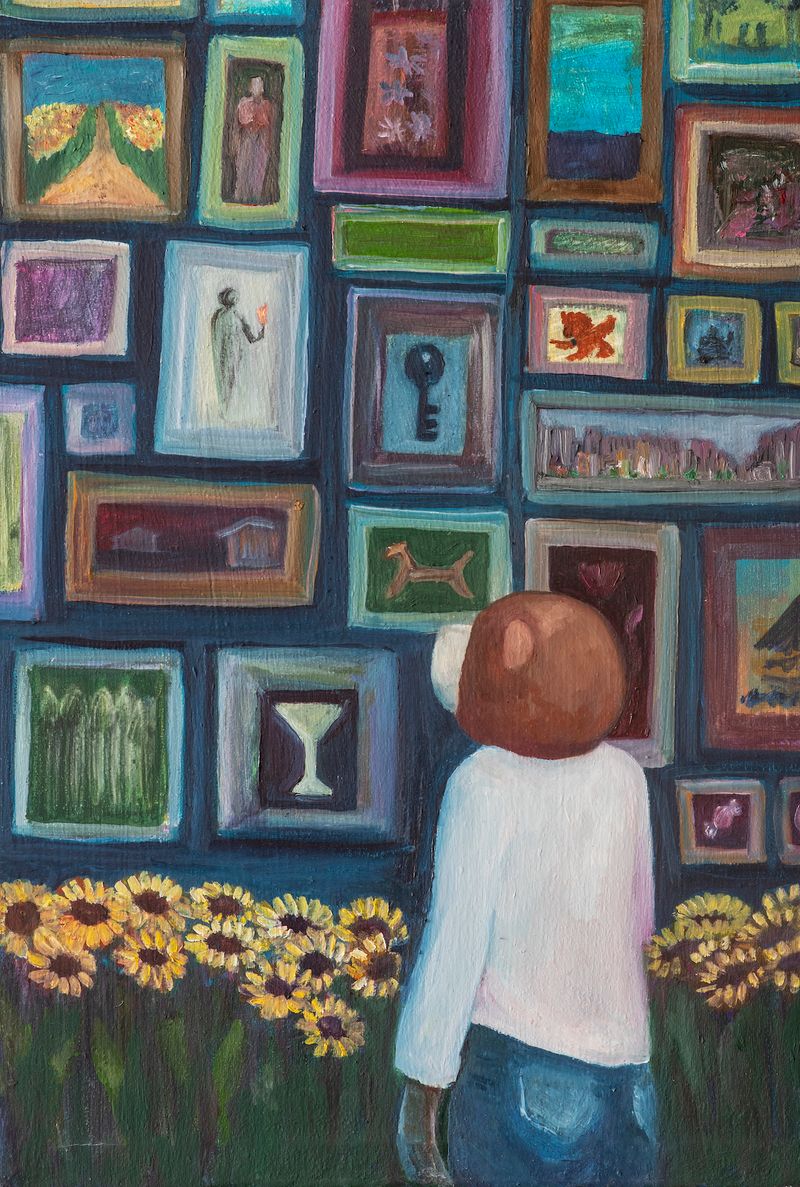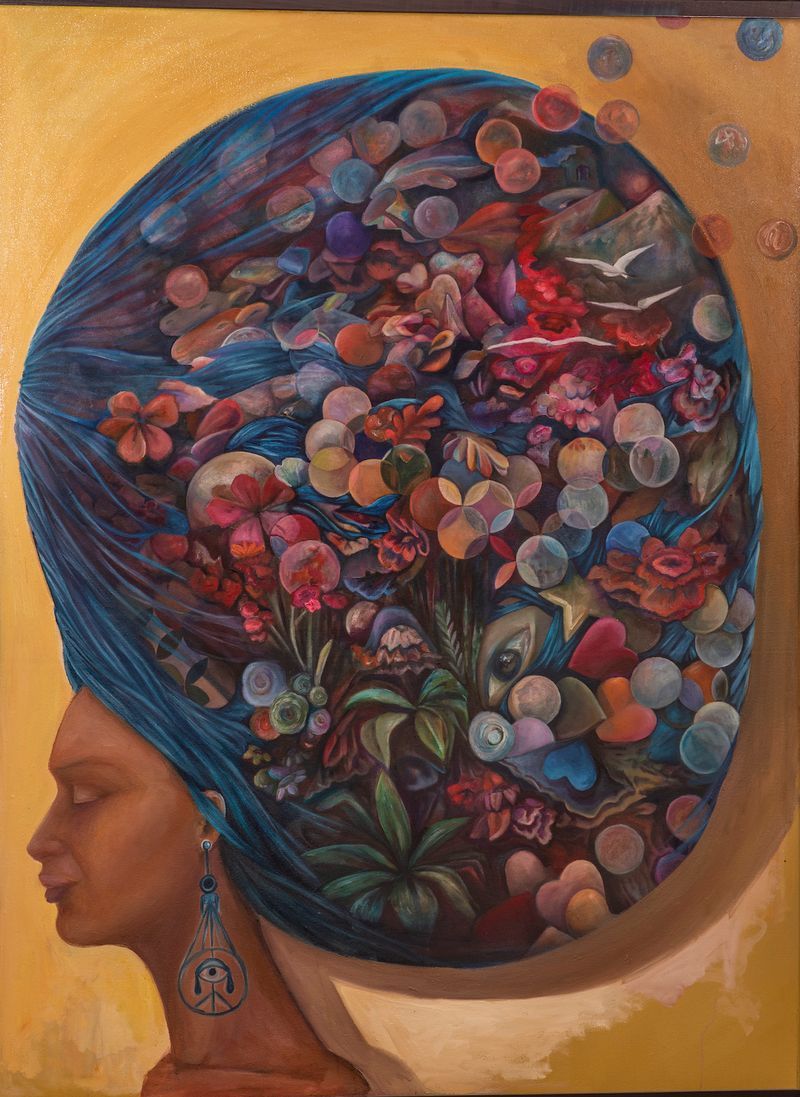
In her apartment overlooking the Nile River in Cairo, Egyptian self-taught artist Hana Afifi, 29, is busy explaining her recent work to visitors. Her guests view the paintings wide-eyed as they behold melancholic half-animal half-human figures often found with teddy bear heads, with their faces sometimes masked—an obvious references to the recent coronavirus pandemic. They are positioned against backdrops of natural landscapes such as fields of sunflowers and bodies of water surrounded by greenery. The cartoon-like characters, sometimes in the form of a group of rabbits surrounding a happy face emoticon, their eyes looking slyly at the viewer as if to say: “Why are you looking at me?” oscillate between feelings of sadness, confusion, joy, and loss.
On show were over 42 oil on canvas paintings in addition to 12 sculptures that Afifi had created over the last two years. Titled “The Keys to Growing Up”, the exhibition, which took place in her home and workspace late May 2022, reflects a novelty in the art world whereby artists usually show their work at a commercial art gallery or institution. Afifi's decision marks a growing trend among younger artists to show and sell their works from their studio.
The cartoonish pop culture figures in the works came as a surprise for several visitors expecting to see more Egyptian references. A few paintings, such as “Close Your Eyes and Open Your Mind” (2021-22) portraying a profile shot of a woman donning a large headdress like those worn by ancient female Egyptians during the time of the Pharaohs, paid tribute to Afifi’s ancestry. While her previous collection was inspired by the ancient Egyptian Pharaohs, this new collection presents kitsch, abstract and surreal representations of life for a young woman with all its ups and downs and states of loss and confusion that she defines as “my George Condo-like confused where is this coming from kind of art.”

For years, Afifi had been encouraged to paint landscapes and figures paying tribute the ancient men and woman of her Egyptian ancestry. “Everyone was asking me to paint these girls and all I had in me was to paint these bears,” she quipped. “If you want me to paint these [ancient Egyptian] girls then I will paint just how confused I am about these girls.”
These latest works depict her desire to break free from such dictation and respond to her own calling as an artist and a young woman journeying through life.
The works on the wall are laden with emotion and were made over the last two years. They reflect an inward journey of self-discovery for Afifi and one where aspects of adulthood, self-acceptance, womanhood merge with broader questions concerning the world and the Middle East during a time of great change.
Afifi smiles as she explains why she began painting the bears: “They were my way of retreating from the world around me, from all the pressure I felt from friends, family and the art community.” A bear, she smiles, is given to children by their parents to distract them. “They play with it, are distracted by it and comforted by the bear,” she says. “You can also say whatever you want to the bear.” Afifi says she grew up with numerous teddy bears. They were often given to her ask gifts after she fell. “I was very clumsy,” she laughs. “They made me feel safe.”
Many of the figures, which Afifi says are women, are partially naked apart from their teddy bear heads. “I wanted to really expose myself. I have nothing to hide anymore. I want everyone to know how I am feeling. It was a time when I felt hurt.” Painting helped her heal. “The minute I put the teddy bear had on the girl’s body all of my frustrations concerning not knowing how to depict the woman’s faces or proper angles went away.”

Unconvinced with the fashion world, Afifi didn’t finish Central Saint Martins. Instead, she moved back to Cairo and worked in retail until she went back to her first love: painting.
“What made me decide to paint again was when I was back in here in Cairo in this apartment designing my entire collection,” she explains. “I was staying up all night and I started breaking down, tearing up all the designs that I made.”
She went and got some paint and began painting a typical looking Egyptian girl from Sinai or a similar place. “She’s wearing the veil with the coins, but it was dark and deep to me; I was loving it and so I decided to paint.”
In 2015 Afifi moved to Florence, Italy where she rented a space and dedicated her time to creating her art. “It was the best decision of my life,” she said. She hasn’t stopped painting ever since.
Afifi’s recent work portrays a young millennial generation in a state of flux. While a few Egyptian references can be founded here and there throughout her new body of work, what the viewer takes notice of are the melancholic, forlorn part female, part male figures in emotional states that seem to be lost or confused.
“The ancient women in my previous collection were stiff in their posture, like the stances of Pharaonic women,” she says. “These figures instead are loose, imaginative and free even as they try and search for answers.”
Outside the window, busy scenes on the streets and on the Nile demonstrate a Cairo in constant motion and change. Afifi’s apartment, while close to the action, feels faraway. In some ways, the variety of her work resembles that of the rapidly changing Egyptian capital. Torn between its ancient and Islamic past and desire to modernize, new and old Cairo, just like Afifi and her Condo-like half-human, half-animal teddy bears and representations of ancient Egyptian females, continues to grapple with how to marry its past, present, and future identity.


